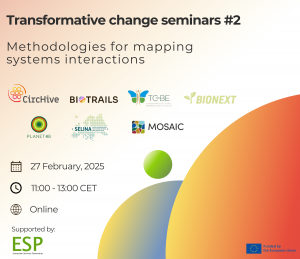
The Transformative Change Seminars is a webinar series by 7 Horizon Europe projects (part of the Transformative Change cluster of projects) working on transformative change for biodiversity conservation, aiming to foster collaborative learning, enhance synergies on concepts and methodologies, co-create adaptive solutions and tools and showcase shared experiences.
This 2nd webinar in the series is focused on “Methodologies for mapping systems interactions” and will feature insightful presentations from the BIOTRAILS, BIONEXT, CircHive and MOSAIC Horizon Europe projects. Hosted within the Ecosystem Services Partnership education & training webinar series, this particular webinar will be touching upon methodologies such as Life-Cycle Assessment, Participatory System Dynamics Modelling, Structural Equation Modelling etc., which researchers are using in biodiversity-driven transformative change research efforts. The audience will have the chance to pose questions to the presenters and discuss the methodologies’ strengths, challenges and experiences in employing them.
Agenda
11:00-11:05 Introduction to the Ecosystems Services Partnership
11:05-11:25 Mapping life cycle assessment (LCA), natural capital accounting (NCA) and input-output (I/O) methods for biodiversity footprint assessment (CircHive project) + Q&A
11:25-11:45 Participatory System Dynamics Modelling exploring the Water, Energy, Food, Transport and Health Nexus approach to enhance Biodiversity resilience under Climate Change—The JUNIPER model (BIONEXT project) + Q&A
11:45-12:05 Participatory System Dynamics Modelling to support policy design in the Climate-Biodiversity-Society Nexus (BIOTRAILS project) + Q&A
12:05-12:25 Structural Equation Models as a tool to unravel societies motives to adopt sustainable behavior (BIOTRAILS project) + Q&A
12:25-12:45 Connecting research to practice: Policy labs as innovative cooperation models to co-produce actionable knowledge to support effective land use policies (MOSAIC project) + Q&A
12:45-13:00 Conclusions and remarks
